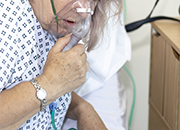COPD, hypertension, shorter length of stay, and no in-hospital anticoagulation tied to return
TUESDAY, Aug. 25, 2020 (HealthDay News) — Return to hospital after discharge for inpatients with COVID-19 is infrequent, according to a study published online Aug. 19 in the Journal of General Internal Medicine.
Sulaiman S. Somani, from the Icahn School of Medicine at Mount Sinai in New York City, and colleagues examined electronic health record data for hospitalized patients with confirmed severe acute respiratory syndrome coronavirus 2 discharged alive from five New York City hospitals. The authors sought to describe clinical characteristics of patients with COVID-19 who returned to the emergency department or required readmission within 14 days of discharge.
The researchers found that 3.6 percent of 2,864 discharged patients returned for emergency care after a median of 4.5 days with 56 requiring inpatient readmission. Respiratory distress was the most common reason for return (50 percent). There were higher proportions of chronic obstructive pulmonary disease (6.8 versus 2.9 percent) and hypertension (36 versus 22.1 percent) among those who returned versus patients who did not return. Return to hospital was more common among patients with a shorter median length of stay during index hospitalization, and patients who returned were less likely to have required intensive care on index hospitalization. No in-hospital treatment-dose anticoagulation on index admission was associated with a trend toward return to hospital.
“Future studies should focus on whether these comorbid conditions, longer length of stay, and anticoagulation are associated with reduced readmissions,” the authors write.
Copyright © 2020 HealthDay. All rights reserved.








